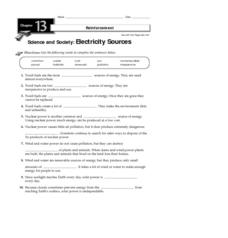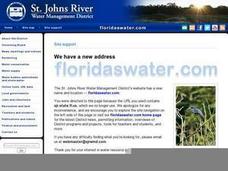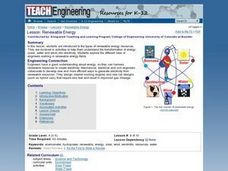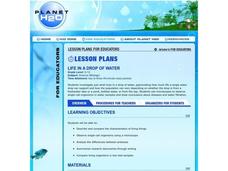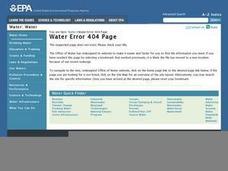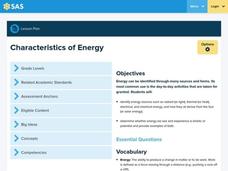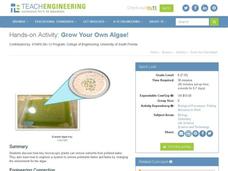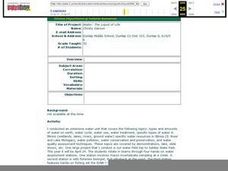Curated OER
Electricity Sources
In this electricity learning exercise, students review the different types of energy sources including fossil fuels, solar, wind, and nuclear energy. This learning exercise has 10 fill in the blank questions.
Curated OER
Water Walk
Students follow the appropriate sampling protocol and take two measurements of a local water source. These measurements are Transparency and Temperature. This info about local land use and/or water chemistry issues may require further...
Curated OER
Lesson 11 - Potable Water
Students investigate the meaning of potable water and water reuse. They define water quality and quantity problems. They complete worksheets, a quiz and design a poster.
Curated OER
Water Anaysis
Pupils conduct three tests of water quality that can be utilized with TerrAqua columns and outdoors: pH, dissolved oxygen, and temperature. They make comparisons between different types of water and draw conclusions about how healthy...
Curated OER
Current Groundwater Contamination Research
Learners research the effects of groundwater pollutants on life. They name and describe 1 environmental factor that has an effect on our drinking water. Students read the Water-Groundwater and Pollution Article. They discuss and...
Curated OER
TE Lesson: Renewable Energy
Young scholars examine renewable energy sources such as solar, water, and wind. They experiment to determine how renewable energy is transformed into electricity. They investigate the role of engineers who work in the field of renewable...
Curated OER
The Wetlands
Fourth graders learn what a wetland is, where they can be found, and what types of plants, animals and characteristic are associated with the wetlands. They also participate in an activity to explore and enhance their knowledge of...
Curated OER
Life in a Drop of Water
Students examine the structure, function, and characteristics of microscopic organisms that inhabit freshwater through collection of water samples and observation through microscopes.
Curated OER
Thirstin's Groundwater Movement Activity
Students examine how ground water flows through different materials. In groups, they identify the different types of rocks in various aquifers. To end the lesson plan, they pretend to be water as others pretend to be rocks and try to...
Curated OER
Freddy the Fish
Students complete an experiment. In this water pollution lesson, students brainstorm information about river habitats and water pollution. Students then read the story Freddy the Fish and complete an experiment where they use a...
Curated OER
Characteristics of Energy
Fourth graders view a video and create a KWL to identify energy sources. In this energy sources lesson, 4th graders explore the meaning of energy, kinetic energy, potential energy, thermal energy, radiant energy, and electrical energy....
Curated OER
Where's the Drip?
Students detect water leaks. For this water conservation ecology lesson, students take a tour of the school grounds and identify sources of water and possible leaks. Students report leaks to the custodian and administration.
Teach Engineering
Grow Your Own Algae!
Develop a model of a wastewater treatment center. The last activity of the unit has pupils mix a lake water sample into a tank of water containing fertilizers. Over time, the algae from the lake water grows and removes the nutrient-rich...
Teach Engineering
Aerogels in Action
Model an oil spill cleanup. An engaging engineering lesson has groups using aerogels to simulate an oil spill cleanup (vegetable oil in water). Along the way, they learn about nanotechnology and hydrophilia/hydrophobia.
Curated OER
Volcanoes: Kindergarten Lesson Plans and Activities
In the pre-lab, kindergarteners mimic the movements of the eruption of a volcano and discover various volcanoes around the United States. Then, pupils sort different types of volcanic rocks in the lab before learning how volcanoes grow...
Shelby County Schools
How Ecosystems Work
How does one organism get its energy? What is the main source of energy in an ecosystem? How does the flow of energy affect different types of ecosystems? Answer these questions with a fill-in-the-blank worksheet.
Curated OER
Volcanoes: Fourth Grade Lesson Plans and Activities
Young geologists begin exploring volcanoes of different structures and states: active, extinct, or dormant. During the lab, they make three models and compare different types of volcanoes, including composite, cinder cone, and...
Curated OER
Tornado!: Types and Formation
Students discuss the different types of tornadoes and how they form. Working in groups, they record journal entries by conducting experiments with water bottles simulating vortex formation.
Curated OER
Water Pollution Lesson Plan: All Messed Up
Students map and calculate the area of the school parking lot and then the volume of water falling on the school parking lot. They map the route surface runoff will take to the nearest water body and describe the roles that human...
Curated OER
Water Filtration Competition
Students design water filtration systems. They draw sketches and write paragraphs about their systems. After presenting their systems to the class, each group then builds their system and determines its effectiveness for purifying...
Curated OER
Exercise and Water
Second graders discover the needs of their body by trying different types of aerobic exercise. In this physical education lesson, 2nd graders analyze The Busy Body Book by glancing at the pictures inside and predicting what the...
Curated OER
Living Sources of Weathering
In this sources of weathering learning exercise, students read about the various things that cause weathering including plants and animals. They answer four critical thinking questions about weathering.
Curated OER
Water Pollution Graphing Activity
Students describe and identify the link between land use activities within a watershed and water quality. They evaluate the quality of a "water sample" ( a bag of skittles), graph their results, and form a hypothesis about the land use...
Curated OER
Water: The Liquid of Life
Sixth graders complete a lesson on the properties, types and amounts of water on Earth. In groups, they travel between stations to identify water resources in Illinois and pollution sources. They complete the lesson with a field trip...


